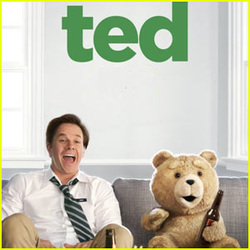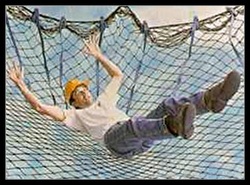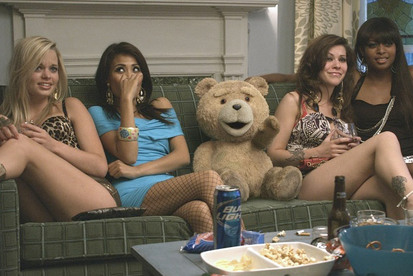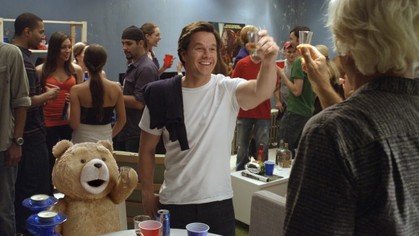 Pictured above: Assholes. by Justin Eisenstadt Now, I know that movie reviewing is really Colin and Sean's joint, but my little brother Adam dragged me to see this movie (by offering to pay for me) and I find myself compelled to offer some thoughts about a film that, while not the worst thing I've ever seen, does represent everything that's wrong with comedy today. And by that, I'm referring to Seth Macfarlane. Unless your utterly pretentious claim of not owning a television is actually true, then you already know that Seth Macfarlane is the hugely successful writer, comedian, voice actor, and a number of other words that end in "-er" who is responsible for the show Family Guy, American Dad, and The Cleveland Show. And I assure you that I fully intended to use the singular term, "show." Ted is a movie about a boy named John Bennett who makes a magical Christmas wish that brings his stuffed bear to life. The two vow to remain best friends forever and 27 years later, John is now a directionless tool and Ted is an obnoxious, racist asshole. John has inexplicably managed to gain the love and devotion of Lori Collins, played by Mila Kunis. However, John's immaturity and Ted's insufferable antics are putting a real strain on John and Lori's relationship. How will John be able to choose between his loudmouthed pothead bear and his incredibly attractive, funny, and intelligent girlfriend who makes more money than him and constantly puts up with his bullshit? Alright, now that I've deconstructed the incredibly complex plot of this film, allow me to explain why, in spite of its huge box office success and bewilderingly positive public and critical reception, this movie is just plain shitty and quite possibly heralds the decline of comedy in cinema as we know it. Now, I don't actually believe that statement, but I do find it quite troubling that so many people enjoy this movie. I understand of course that humor is completely subjective. So when I tell you that I only laughed at about five lines in the entire two hours of running time, I realize that's not going to be all that helpful to you as a reader and potential viewer. The thing that's troubling to me is why it fails not only as a comedy, but simply as a film. At the end of the day, what brings this movie down is the same thing that caused Family Guy to go from a novel and humorous show to one that is tired, grating, and at times nearly un-watchable. Seth Macfarlane has become so successful that he no longer has anyone to tell him when his ideas are bad. He has no editor. Or, he simply refuses to listen to anyone. If you cut about 20 to 30 minutes off this movie, it would be at least decent - not great, but decent. As it stands, it's just full of line after line of jokes that are stupid, painfully obvious, or just downright offensive. I'm convinced that Seth put literally every single joke that popped into his brain into the script and refused to cut a single one. Seth Macfarlane's idea of humor is pointing at a cute, anthropomorphic character and saying, "Hey look, guys, this thing that shouldn't be talking is making a bunch of pop culture references and saying inappropriate things. Isn't that outrageous?" Let me ask you, if you had a friend and he suddenly made a racist statement about black people or Jewish people, you'd probably just let it slide, right? He probably just didn't realize that wasn't funny. And he did the same thing two or three more times, well he's probably just very slow at picking up on things. But if he continued to make unfunny racist jokes, you'd probably sit him down and say, "Look, Steve, we think you might have some serious issues that need resolving." Seth Macfarlane apparently does not have any friends that are willing to do this. Look, I'm a really laid-back guy and I don't get offended when someone makes some crack about Jewish people. But the sheer number of times that Seth Macfarlane continues to "poke fun" at the Jewish people in the entertainment he creates is getting even me concerned. There's a scene in this movie where Ted and John, drunk at a party (and by the way that party scene was about three times longer than it needed to be), are discussing their idea to open an Italian restaurant. Ted says emphatically, "Hey, I've got an idea! Let's make the restaurant inclusive. Like, if a Jewish person comes, we won't say anything, we'll just let him in!" John, taken aback, replies, "Why would you even say that?" Ted says, "We don't say it, that's the point."
"Why would you even bring it up?" "We don't bring it up, we just let him in." Marc pauses, and says, "Um, ok, right, so Jewish people are allowed in." Ted affirms, "Yes. But no Mexicans." I realize I've already broken my promise of keeping this review brief, so I'll end on this note. Seth Macfarlane is a funny guy. Really, in spite of all I've said, I do think he's a funny guy. Clearly has some issues to resolve, just like our friend Steve, but a clever and witty comedian nonetheless. However, he's a shitty writer. He can't tell a proper story, so he pads it out with extraneous dialogue and Family Guy-style cutaway gags. And the fact that the American public seems generally okay with this offends me far more than any racial slur that Ted spouts off in this movie. As someone who aspires to a career in writing fiction, let me leave Seth with this message that he will never read: no amount of pop culture references can make up for bad storytelling. If you just want to tell jokes, do stand-up. Film is for telling stories.  by Justin Eisenstadt [A few notes: This post is of a much more personal nature and the opinions stated here do not necessarily represent those of CastWave Studios. Public Allies is an Americorps program that provides young adults with full-time non-profit apprenticeships and rigorous leadership training. It's a great program and I urge you to learn more about it here.] I no longer fear failure. We’re old friends, failure and me. I experience it day after day, month after month, year after year. This may come as a surprise to those who assume I have my shit together, that I am deserving of praise for the things I have accomplished: college graduate, straight-A student, Eagle Scout, respected by my friends and peers. But if I get to decide what constitutes success for me, then I should also get to decide what constitutes failure, and in spite of whatever accolades I may have garnered, believe me when I say this – I am, or more accurately, have been a failure. Here’s the thing, though - defeat is permanent, but failure is only temporary. Failure is an action, but defeat is a state of being –and we are only defeated when we admit defeat. So why am I a failure? Because day after day, month after month, year after year, I have failed to be the thing that I know, deep down, that I am meant to be: a writer. I have wanted to be the next Stephen King since I first learned who Stephen King was, and yet, almost 20 years later, I have yet to finish even a single novel. I’ve started and abandoned many, and dreamed up countless more, but I’ve never finished a single one. People like my dad and my brothers always ask me, “What happens if you fail?” No one ever asks me, “What happens if you succeed?” This fear of failure, coupled with the idea that I need to be “realistic,” has driven me to do many things that have moved me further away from goal rather than closer to it. It drove me to major in Mechanical Engineering, then it drove me to major in Computer Science, and – sad to say it – it is what drove me to do Public Allies. I think that in spite of whatever reasons I gave about social justice and helping the community I may have initially given, the real reason I joined was because even a nebulous notion of “working for a non-profit” seemed like a more reasonable life plan than being a writer. Well, I’m done being reasonable and I’m done being realistic. It’s time for me to admit that writing is more than just a hobby, it is my career, and it is the only career that I will ever be happy doing. I’m sure that, phrased like that, that statement becomes immediately obvious and straightforward, but you have no idea how long it’s taken for me, thickheaded as I am, to finally appreciate a fact that millions of people before me have already realized – that your day job and your career are not the same thing, that in fact they may have absolutely nothing to do with one another. And that’s totally okay. I am not “destined” for anything. I decide my life’s purpose, not society or fate or the intractable whims of an invisible deity who expects me to live in service of him. I have no personal lord and savior, and I have no interest in preserving the status quo. The truth is that there is no status quo. The only constant is change, and you can either embrace it or resist it. Or, you can take the third option – you can cause it. Ten months in Public Allies have exposed my strengths and failures in a way that four years in college did not. I lack the organizational skills and time management skills, not to mention the selfless devotion to the community, necessary to ever achieve anything more than “adequacy” as a non-profit leader. I might become an above average leader, but I will never excel in this field for the same reason that I will never be a good father – frankly, I’m just too self-centered. That is not to say that I don’t care about others; to the contrary, I have a deep and unshakeable faith that there is good in humanity, that even in the darkest corners of the world, hope takes root and stubbornly fight to break through into the light. I am an observer, standing at the edges on the outside looking in. I often call myself insightful, as do others. Break apart the word insight and look at it literally: “in” and “sight.” To find truth, we gaze within ourselves. We internalize external stimuli and filter them trough that fleshy supercomputer known as the brain in order to distill meaning. This, to me, is the true magic. This is why I do not believe in God, although I certainly do not begrudge anyone their personal beliefs. But allow me to explain what I mean. To look at a world that was created specifically for us by some all-powerful being and call it beautiful is not to appreciate it but simply to state the obvious. But to see beauty in a universe that is chaotic and random, to find meaning in a world that is inherently meaningless – that is what it means to truly appreciate life. We hear a sequence of pitches and rhythms and our brains call it music; we see a bunch of multihued splotches on a canvas and our brains call it artwork. We don’t just perceive patterns; we create them. Writing is a lot like an iceberg – even though the written word on the page is all we see, it’s only 10% of the process; the other 90% of the process takes place under the surface. The same thing applies to people. I’m a quiet guy, and I tend only to speak when I feel I have something worth saying, but as you might gues, there’s a lot going on inside my head. Often, there’s far too much, in fact. One benefit of Public Allies is that I have gotten better at sharing my ideas and am more focused about my goals. So what are my goals? Allow me to lay them out: finish a rough draft of my novel by the end of this year. Have a completed final draft by the end of next year. Hopefully, find someone to publish it by the end of 2014. Headline a show for 100 or more people within the next six months. Record my first album by the end of next year. Make CastWave Studios a legitimate business within the next two years. Move to Seattle and become completely independent within the next five years. Those are unrealistic goals, perhaps, but not unattainable. And what separates me from all the thousands of other people who also want to be published authors, recording musicians, or podcasters with hundreds of thousands of subscribers? Nothing really. I’m sure they all want it just as hard as me. I’m sure most of them are just as talented. The only thing that will separate me in the end is the outcome; I will either succeed or I will die trying. The third option, giving up and relying on my “safety net,” is no real option at all. I will close with this thought: safety nets are dangerous. If you spend your whole life building a safety net, you never actually do the thing you want to do. I’m shredding the safety net. I’m not afraid to fall. |
Archives
October 2020
Categories |
Proudly powered by Weebly



 RSS Feed
RSS Feed